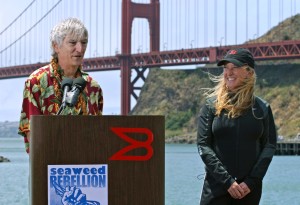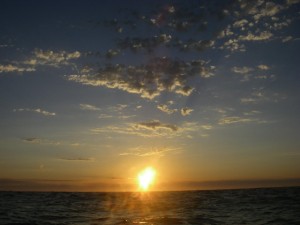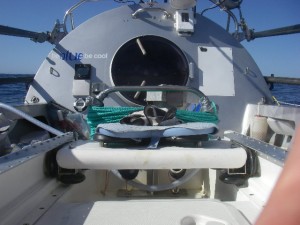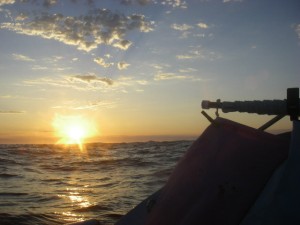23 Jun 2008, The Brocade

My Pacific row is a project of the Blue Frontier Campaign, a US-based nonprofit that focuses on supporting grassroots (aka seaweed) efforts to preserve the oceans, and organizes forums to build consensus and collaboration amongst other organizations involved in marine conservation.
Today I am honoured to feature a special guest blog written by David Helvarg, the President and Founder of the Blue Frontier Campaign, and author of 50 Ways to Save the Ocean. Informative, eye-opening and constructive - I highly recommend this blog. Enjoy! And act.
THE ROZ CHALLENGE
Five years ago I was going through some hard times, as were our living oceans. I'm better, they are not.
A recent study in the journal Science found that 40 percent of the oceans are heavily impacted by human activities while only 4 percent are in a pristine state. Another study found 90 percent of large ocean fish, including sharks, big tuna and billfish have been killed off since 1950. A FEMA report predicts one out of four U.S. houses built within 500 feet of the shore will be destroyed by rising seas in the next 45 years.
The best available science tells us more than half the world's tropical coral reefs will die as a result of fossil-fuel driven climate change that has already taken place.
And now President Bush and Republican presidential candidate Senator John McCain are pushing to reopen long-protected offshore waters to new oil drilling. Shortsighted government policies such as these only worsen the effects of marine disasters linked to industrial overfishing, pollution, coastal sprawl and climate change. The most frustrating thing is we know what the solutions are; we just haven't summoned the personal and political will to implement them-at least not yet.
People often ask me what they can do about such seemingly overwhelming challenges as the collapse of marine wildlife or fossil-fuel fired climate change, especially when they're already so busy with work, raising families and other obligations. My response is that you're already doing something. We all impact the seas around us by the things we do every day as consumers and citizens. The challenge is to be aware of what you're doing and then make the right choices. What I found in writing the Blue Frontier Campaign book '50 Ways to Save the Ocean,' is that in doing what's right for our ocean planet we usually end up doing good for ourselves, for our health, our pocketbook and our sense of self-worth.
Which brings me to what I call the Roz Savage Challenge. I met Roz through another Seaweed (marine grassroots) activist, Margo Pellegrino,
a New Jersey wife and mother who decided to paddle an outrigger from Miami to Maine last year to raise money and awareness on behalf of
seaweed activist groups like Surfrider (eco-surfers) offering bottom up solutions to coastal and marine problems. Margo's now about to paddle from New Jersey to Washington DC in support of a U.S. Ocean Act to assure the ecological integrity of our public seas. After she introduced me to Roz who had already rowed solo across the Atlantic and
planned to become the first woman to row solo across the Pacific to raise awareness of plastic pollution and other threats to our blue planet, Blue Frontier offered to make Roz's Voyage a project of our non-profit campaign.
Riding alongside her under the Golden Gate Bridge last month with Paul from SF Bay Adventures, her rowboat outlined by the lights of the city and escorted by a curious sea lion, I was overwhelmed by the scale of the challenge she'd set herself, set herself again I should say. Last year's disappointment had only steeled her to try again with more ballast and gumption. Our rigid hull inflatable turned back by the Point Diablo Lighthouse while Roz rowed on towards the sharky waters of the Farallone islands twenty seven miles away and Hawaii twenty four hundred miles beyond them, the first leg of her Pacific voyage.
So here's the challenge! If Roz can row an ocean to protect the diversity of life on our blue marble planet can't each of us do something in our own lives?
Can we give up drinking water from plastic bottles for example that end up polluting the sea, costing us a fortune and using up fossil fuels in both their production and transport? Why don't we instead work to assure safe and healthy drinking water from our taps? New York City has some of the best drinking water in the world, the champagne of tap water, in part because it chose to invest in protecting its rural Catskill Mountains watershed and reservoirs from unneeded development and pollution. Solutions are all around us!
Can we drive less and walk/bike more, use public transportation where it exists and fight for it where it ought to? Let's keep our money out of the pockets of oil companies like Exxon-Mobil that continue to deny the catastrophic threat global warming poses to our oceans and to us all.
Can we eat more organic and vegetarian food to reduce the runoff of nutrient heavy synthetic fertilizers, pesticides and animal wastes into
our coastal waters? This is also a healthier and tastier choice.
We can do these things and many more. If Roz can row oceans to challenge herself and spread the word on the state of our seas we ought to all try and be ocean heroes in our own lives. Who knows, working together we just might turn the tide and inspire a solution-oriented seaweed revolution. We'll see you on the other side.
Fair winds and safe rowing Roz
David Helvarg
President & Founder
Blue Frontier Campaign
Picture: Roz with David Helvarg, San Francisco, 2007
Other stuff:
Today I crossed the line of longitude at 124 degrees west - for the fifth time. I've been out and back, out and back, and now out again. It would be really nice if this is the last time.
The watermaker again refused to work beyond a few short-lived gurgles. I am experimenting with diverting power from all solar panels to a single
battery to try and summon up enough "oomph" to keep it going for longer. Will try again tomorrow.
Hi to Paul (looking down at me from a plane) and Nicole (looking across at me from LA) - can you see me waving?!
Guten Tag to Matze Bley of Germany. Leider kann ich kein Deutsch. Vielen dank. Auf Weidersehen (Pet).
John Pullin - no noticeable effect from the land any more. The wind seems to do whatever it pleases, at whatever time of day!
Tom and the guys at the outdoor store - thank you! I shall row all the harder to get to Hawaii so I can open my box of goodies.
Thanks Martin for the suggestions on the sea anchor and anchor bridle. Didn't quite get it from your description, but we'll talk it over sometime when I'm back on dry land.
Hi also to Kathy, Pippa (life after rowing? Yes, I have a plan, but not ready to divulge just yet!), Rod (I love sashimi! But no fishing until I am in the "happy zone" of tailwinds), Ryan, Alexandria and Audrey,
Sophie and Jeanne and schoolmates (the coolest and bluest!), Star Siegfried.
Steve in Colorado, training for a marathon - sounds like the training is coming along well. You keep dreaming about your marathon, and I'll keep
dreaming about Hawaii.
And a special hello to my cousin Diane - a much better endurance athlete than I am. An interesting excerpt from her email here, about a local half marathon: "I surprised my self by taking 3rd lady and 1st vet 45. Interestingly all the top places were taken by veteran ladies and you had to go down to 14th before finding a lady that was not a vet. So fear not - reaching the grand age of 40. In endurance events it means life has only just begun." Hear, hear!!
PS from Rita:
Position for Roz last night: 31 58 533N, 124 14 385W.
Marine Track has sent later updates.
|
|
21 Jun 2008, The Brocade

Four weeks out here already. Time flies when you're having fun, hey?!
If I'd written that after my first month on the Atlantic, it would have had a distinct whiff of sarcasm. The first month of the Atlantic Rowing Race was one of the most stressful, terrifying and depressing I had ever experienced. I was on a huge emotional rollercoaster, over-reacting to every change in circumstances and weather.
But it WAS a useful learning experience.
As the saying goes, experience is one of those things you get just after you needed it - so rather than let that intense learning experience go to waste, I decided to row another ocean. The best way to find out whether I'd actually absorbed the lessons learned two years ago was to put myself in an equally challenging situation and see how I coped with it. Could I face the Pacific with greater equanimity than I managed on the Atlantic?
And so far, so good. Although this voyage has had its share of fear and frustration - with high winds, big waves, a swamped watermaker and a temperamental sea anchor to contend with - it actually hasn't been bad at all, and I've spent most of the time feeling cheerful, positive and determined. I've adapted quickly to life back on the ocean, and generally accept it for what it is - with all its discomforts, inconveniences, trials and tribulations.
Ideally, I would learn to be happy anywhere. My happiness would be inside me, independent of circumstances, so I could be equally happy in a jail as in the most beautiful place in the world. Happiness, surely, is seeing the perfection in everything.
OK, so in the last 4 weeks I haven't actually got very far, but as Zen Dog reminds me, It's not the destination, it's the glory of the ride.
Other stuff:
The watermaker didn't work today. Its feed pump revved apathetically for a couple of minutes, and then stopped. I'll try it again tomorrow and see if it's in a better mood. This approach may not be rational, but it has worked before.
Otherwise, a fine day's rowing. I've clawed back some vital miles westwards, and it's been a gorgeous day - blue skies, fluffy white clouds, sunlight glinting off the ocean - perfect.
I'm sorry - I'm really too tired and sleepy to write individual acknowledgements of all the lovely messages that have been coming in - but I have read all the ones that my mother sent through, and I really appreciate all the love, support, sympathy, encouragement and helpful hints that have been coming through. You are all wonderful people.
Thank you!!!
Position Sunday morning: 32 20 574N 123 56 733W
|
|
20 Jun 2008, The Brocade

Continuing my series of descriptions of aspects of my day..
Rowing - that's what I do. And today I've done a lot of it and I'm knackered, so I'll keep this one short.
Some people are incredulous when I tell them what I do. This exchange is not untypical.
"What, no engine?"
"Nope, no engine."
"What, no sail?"
"Nope, no sail."
"Just rowing, huh?"
"Yes, just rowing."
"What, are you crazy?"
But no, I'm not crazy. I don't know how to sail (despite numerous attempts to learn) and I don't know how to maintain an engine, but I do know how to row - so when I was looking for my Perfect Project, rowing across an ocean seemed to me perfectly logical.
I rowed for 3 years at Oxford University, representing the university twice against old rivals Cambridge. Then I rowed for another 5 years in London, but had retired 10 years before I decided to do the Atlantic.
Now I seem to be back into rowing - with a vengeance.
Ocean rowing is a very different proposition from river rowing, but certain fundamentals are the same. I have a sliding rowing seat that glides on runners, similar in principle to what you would find in a racing shell, but seriously beefed up - see photo. Mine was built by Gig Harbor Boat Works in Seattle. I have oars, made of solid ash and wrapped in carbon fibre, made by Sawyers Paddles and Oars of Oregon. I have 4 oars in total - 2 main and 2 spare, with the spares doubling up as guardrails. My feet are held in the boat by New Wave rowing shoes fixed to a footboard.
So far, so similar, but there are a few differences. As I spend so much time on my rowing seat I need a bit of extra cushioning, so I have a pad made by Bottomliners. It has pop fasteners that clip on and off the rowing seat so I can take it into my cabin to keep it dry. On top of that I have a homemade cover made of the same fabric that camping towels are made from - fast drying and wicking.
Instead of having ordinary rowing oarlocks, I use chunky metal oarlocks more commonly used for whitewater rafting - much stronger for when conditions get rough. These are mounted into custom-made riggers that extend about 6 inches from the sides of the boat.
And finally I have my rowing gloves - kangaroo skin golf gloves made by Kakadu of Australia. I got through 5 pairs of these on the Atlantic, and I mean REALLY got through - I wore each pair until they were more hole than glove. They stop me getting open blisters - I get calluses, but no open wounds that would be vulnerable to infection.
Depending on weather, circumstances, and energy levels, I row for between 8 and 15 hours a day, in shifts of 2 or 3 hours, with half-hour or one-hour breaks. Nothing fancy about it - I just sit on my rowing seat, and I row, row, row...
[photo: my rowing seat, looking toward the stern of the boat (the way I face when I am rowing). Beyond my rowing seat you can see the cleat that I improvised yesterday so I could retrieve the sea anchor tripline.]
Other stuff:
A good day today. Weather conditions favourable, so a busy day's rowing, sunrise to sunset. Watermaker still working. New sea anchor rig functioning well. Life is good.
Thank yous and hellos to Rich and Marilynn Ames and Ken in Eureka, Stephanie Batzer, Cheryl Mannix, Mark York, David Jones
Special hellos to some faithful correspondents from the Atlantic crossing: Helena S-S: baffled by the riddle. Looking forward to the clue! And I shall aim to get my subjunctives correct in the future. (Oh dear, that doesn't seem quite grammatically correct either.!) Bonjour Jean-Francois! Sounds like you are working way too hard! And John F Taylor - yes, I really am most definitely out here!!!
Rob - thanks for spreading the word.
Chuck - I will try out the GPS remedy. Thank you.
Pippa - after seeing my logbook you think I would make a good accountant?! I am mortally offended!
Thanks also for comments from Ultrathoner, Bruce, Roberto, Dana, Ross and Bob.
Randy - thanks for all the questions. I will try to get round to answering them all in future blogs.
|
|
19 Jun 2008, The Brocade

Last night I went to bed feeling despondent, bordering on morose. My sea anchor was all snarled up in its tripline, and I couldn't figure out how I was going to get it back on board. Even worse, I seemed to be unable to break free of the California coast - I was being swept ever eastwards, and further away from Hawaii. I'd been trying to put a brave face on things, but I had been getting increasingly anxious over the preceding few days and wondering just how I was going to break free of this apparent deadlock.
This morning, as I was waking up, an idea came to me. The problem with the sea anchor was that although I could pull it in a certain distance, the next time a big wave came along it would yank the line out of my hands and I would lose the progress I had made. What I needed was a cleat that would allow me to wind the line around it, taking the strain off my hands and bringing the line in little by little. But I had no suitable cleats in the cockpit.
Aha! Lightbulb moment!
There is a grabrail in the cockpit that would serve as a cleat, if only I could put some kind of stoppers on it to stop the line sliding off the top when the tension bit. A couple of Quickfists (made by Davis Instruments) should do the trick, if I held them in place with duct tape.. I jumped out of my bunk (well, as much as you can jump in 3 feet of headroom) and set about implementing my brainwave.
It was one of those deeply satisfying experiences, when you have a good idea and you put it into practice and it goes exactly as you hoped it would. I built my cleat, hauled in the sea anchor, spent a couple of hours sorting out its tangled lines and refined its design to try and avoid similar problems in the future.
I then spent the rest of the day rowing, putting in a solid 8 hours and clawing back a few miles westwards. Suddenly the world seemed a better place.
But I try to remind myself - as I did during the tough times - nothing lasts forever. So I mustn't get over-excited. Many trials lie ahead, and not every day is going to be as good as today. It's all yin and yang, ups and downs, swings and roundabouts.
But it was really, really good to have such a successful day - a great boost to morale.
[photo: thought about showing off my improvised cleat, but tonight's sunset was too pretty not to share]
Other stuff:
And MORE good news! Audible.com are going to sponsor my thrice-weekly podcasts with Leo Laporte. This will earn me a little bit of revenue, depending on how many people download our podcasts. So if you are not already following our chats, PLEASE DO! As well as being informative and (hopefully) entertaining, they are now also cash-generators for my efforts to spread the message. On Tuesdays and Thursdays Leo and I talk together, and starting from this weekend we will be doing a Q&A session on Saturdays, where listeners get to call in and ask me their questions. Check it out!
Thanks to Jennifer Raiser for her lovely message. Nice to know that the Woodside gang still care, and if I am back on dry land when Burning Man comes around I will certainly bear it in mind. Burning Man is most definitely on my list of things to do - although as you say extreme camping may not be top of my list of priorities just then!
Hey Russ on the Farallones - great to hear from you! Glad you finally got your antenna (and email) back. The bananas and M&Ms and trail mix were VERY much appreciated - alas now a long-distant memory.. Do you realize, you guys were the last human beings I saw - and that was over 3 weeks ago now?!
Thanks to Simon Chester for the blog. Tom Sweeting - thanks for the offer of a delivery. A slice of pecan pie would be nice. only kidding! Andy White - took me about a week after I arrived in Antigua to be able to walk properly. Very strange experience! Ken Weaver - thanks for the message, and the job offer - but in the nicest possible way, I hope never to need to take you up on it!
Hi also to Robert Forrester, Rob Mohle, John H (very interesting about the ear canals going to sleep!)
Tim Woodman - hope the mantra works for you. It does the trick for me - usually! The subconscious is apparently extra-receptive at that time, just as you are waking up.
Conservation Corner: special hello to Margo - a kindred spirit. And to Dana and the paper recycling mission - keep up the good work! And Bruce Tomlinson (joined car pool, stopped using paper cups) - really encouraging to hear stories of people making changes for the good of the planet.
Current position is .
32 35.259 N, 123 28.554 W
|
|